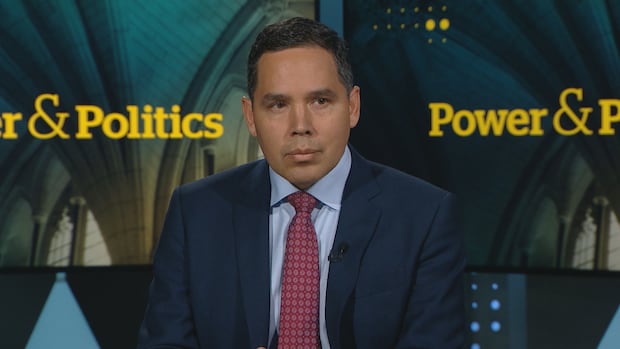IndigenousThe Assembly of First Nations, Inuit Tapiriit Kanatami and the Métis National Council individually submitted budget requests ahead of the Nov. 4 federal budget totalling $443 billion combined over at least the next decade.’Every day that they don’t invest, it’s getting more expensive to close… the gap,’ says AFN national chiefListen to this articleEstimated 4 minutesInuit Tapiriit Kanatami President Natan Obed says he’s been told by federal officials that it’s ‘a really difficult time fiscally for the country.’ (CBC News)Indigenous leaders are looking for long-term funding to close infrastructure gaps in the upcoming federal budget, despite predictions of funding cuts.The Assembly of First Nations (AFN), Inuit Tapiriit Kanatami (ITK) and Métis National Council individually submitted budget requests to the federal government ahead of the Nov. 4 budget totalling $443 billion combined over at least the next decade.ITK President Natan Obed said he was told to not get “our hopes too high.” “We have been told very clearly by officials within departments and within central agencies that this is a really difficult time fiscally for the country, and that there isn’t enough money to go around,” Obed said.While Obed said he appreciates the “large ambitions” to close the infrastructure gap between Indigenous and non-Indigenous communities by 2030, one of former Prime Minister Justin Trudeau’s signature pledges on reconciliation, he said the organization doesn’t see any evidence funds will exist to make that a reality.Before the 2024 budget, ITK and AFN estimated it would cost $425 billion combined to close the infrastructure gap in their communities by 2030.This year, ITK has requested $75.1 billion over 35 years, including $30 billion over 10 years to cover urgent infrastructure needs.ITK’s budget submission said this funding will support 115 projects — 79 over the first 10 years— amounting to $55.3 billion in capital over 10 years, including roads, housing, water and sewer, air and marine infrastructure. “Places like Iqaluit, Inuvik, Cambridge Bay, Kuujjuaq, Rankin Inlet— these are our hub cities or communities, but they are still reliant on World War Two-era infrastructure,” Obed said.ITK’s submission also called for billions of dollars over the next 15 years for education, food security, language revitalization and eliminating tuberculosis in Inuit communities.Exempt essential services from cuts, asks AFNThe AFN’s submission called on the Carney government to exempt essential services on First Nations communities from budget reductions.“They’re not cutting back on transfers to provinces. They should never cut towards First Nations people,” AFN National Chief Cindy Woodhouse Nepinak said.The AFN also requested $367 billion over 10 years in capital investments for a variety of community infrastructure, including clean water, roads and internet connectivity, as well as $139 billion for First Nations housing alone.The submission said capital investments in the First Nations infrastructure gap “has the potential to generate $635.3 billion in economic output over the next seven years.”Woodhouse Nepinak said she is not confident the government will be able to close the infrastructure gap by 2030, but she “will wait and see what the budget has in store for this country.”Assembly of First Nations National Chief Cindy Woodhouse Nepinak holds a news conference on Parliament Hill in Ottawa on Sept. 16. (Sean Kilpatrick/The Canadian Press)“Every day that they don’t invest, it’s getting more expensive to close… the gap,” Woodhouse Nepinak said.Along with requesting funding for First Nations essential services and First Nations’ self-governance, Woodhouse Nepinak said she is hoping to see money toward re-introducing drinking water legislation after Bill C-61 didn’t pass before Parliament was prorogued in January.The Métis National Council (MNC), which represents Métis governments in Alberta and Ontario, submitted funding requests for over $490 billion over 10 years, including $1 billion over seven years to support Métis housing needs. MNC President Victoria Pruden said in a statement the funding is required to implement a joint oversight committee to help deliver safe, affordable and culturally appropriate housing for Métis citizens.The submission said the funding would be reallocated to specific Métis housing needs from the $4 billion Urban, Rural and Northern Indigenous Housing Strategy committed in the 2023 federal budget.MNC also requested funding for priorities including health and wellness, education, data sovereignty and child and family services.According to Indigenous Services Canada, the federal government spent $16.77 billion between April 2016 and June 30, 2025 to support Indigenous community infrastructure.Indigenous Services Minister Mandy Gull-Masty said in a statement the government looks forward to unveiling Budget 2025 and is working with First Nations, Métis and Inuit leadership “to make sure that anything we do is guided by the needs and actions they determine themselves.”ABOUT THE AUTHORJoy SpearChief-Morris is the recipient of the 2025 CJF-CBC Indigenous Journalism Fellowship. She is an Indigenous Black journalist and member of the Kainai Blood Tribe in Alberta. Joy has had bylines in The Globe and Mail, The Narwhal, The Walrus, The Toronto Star, CBC and Sportsnet.
Wednesday, 4 Feb 2026
Canada – The Illusion
Search
Have an existing account?
Sign In
© 2022 Foxiz News Network. Ruby Design Company. All Rights Reserved.
You May also Like
- More News:
- history
- Standing Bear Network
- John Gonzalez
- ᐊᔭᐦᑊ ayahp — It happened
- Creation
- Beneath the Water
- Olympic gold medal
- Jim Thorpe
- type O blood
- the bringer of life
- Raven
- Wás’agi
- NoiseCat
- 'Sugarcane'
- The rivers still sing
- ᑲᓂᐸᐏᐟ ᒪᐢᑿ
- ᐅᑳᐤ okâw — We remember
- ᐊᓂᓈᐯᐃᐧᐣ aninâpêwin — Truth
- This is what it means to be human.
- Nokoma











